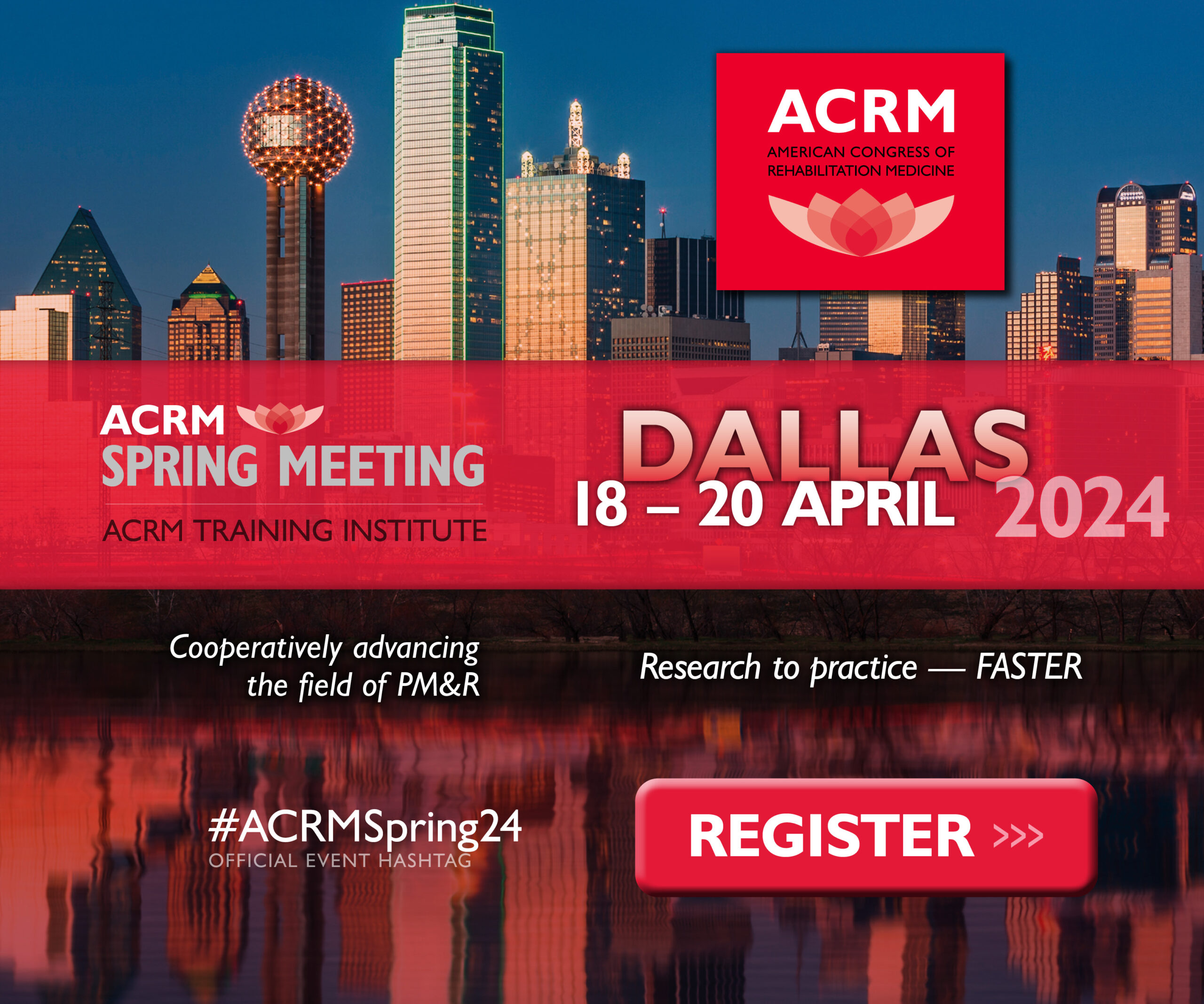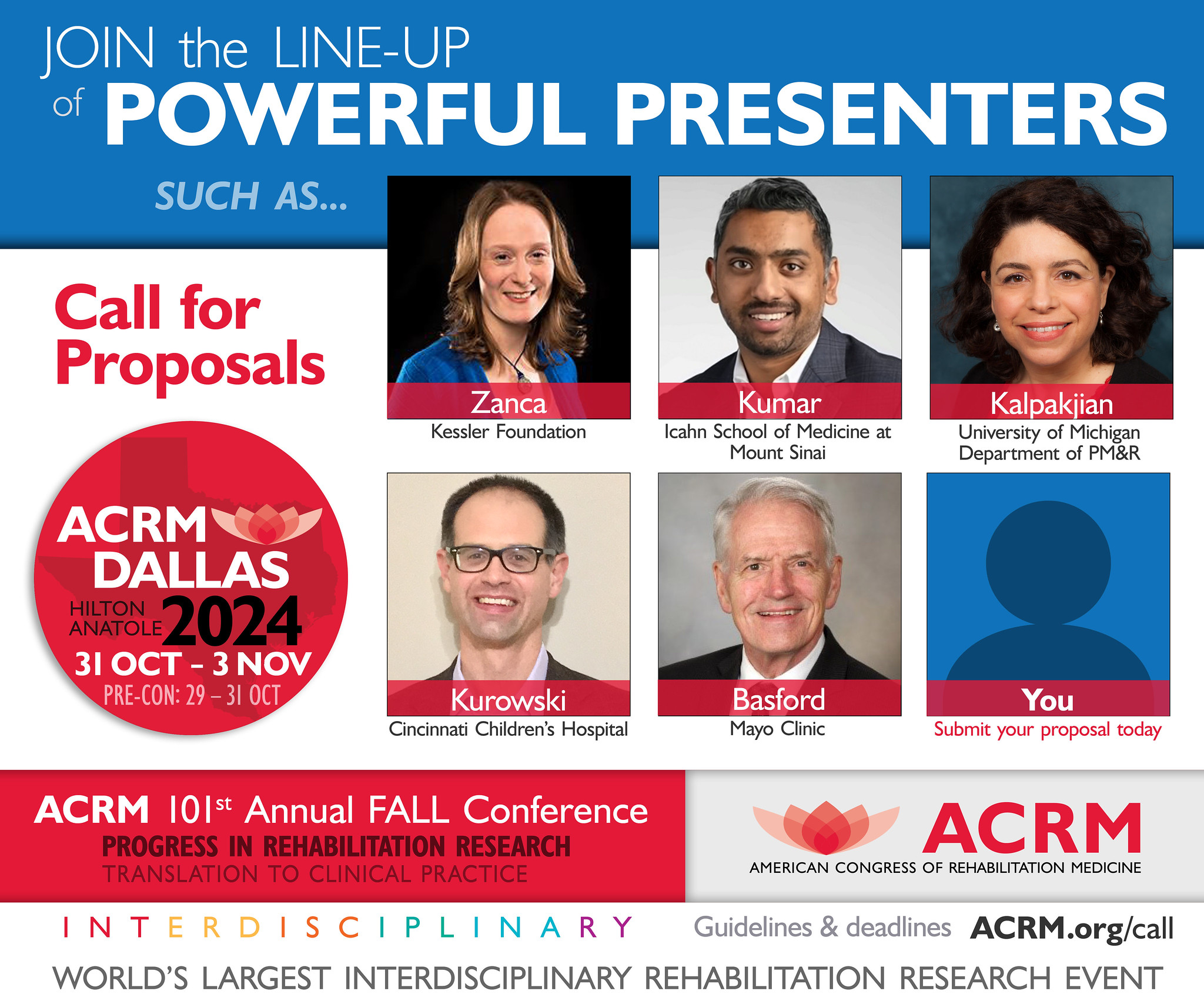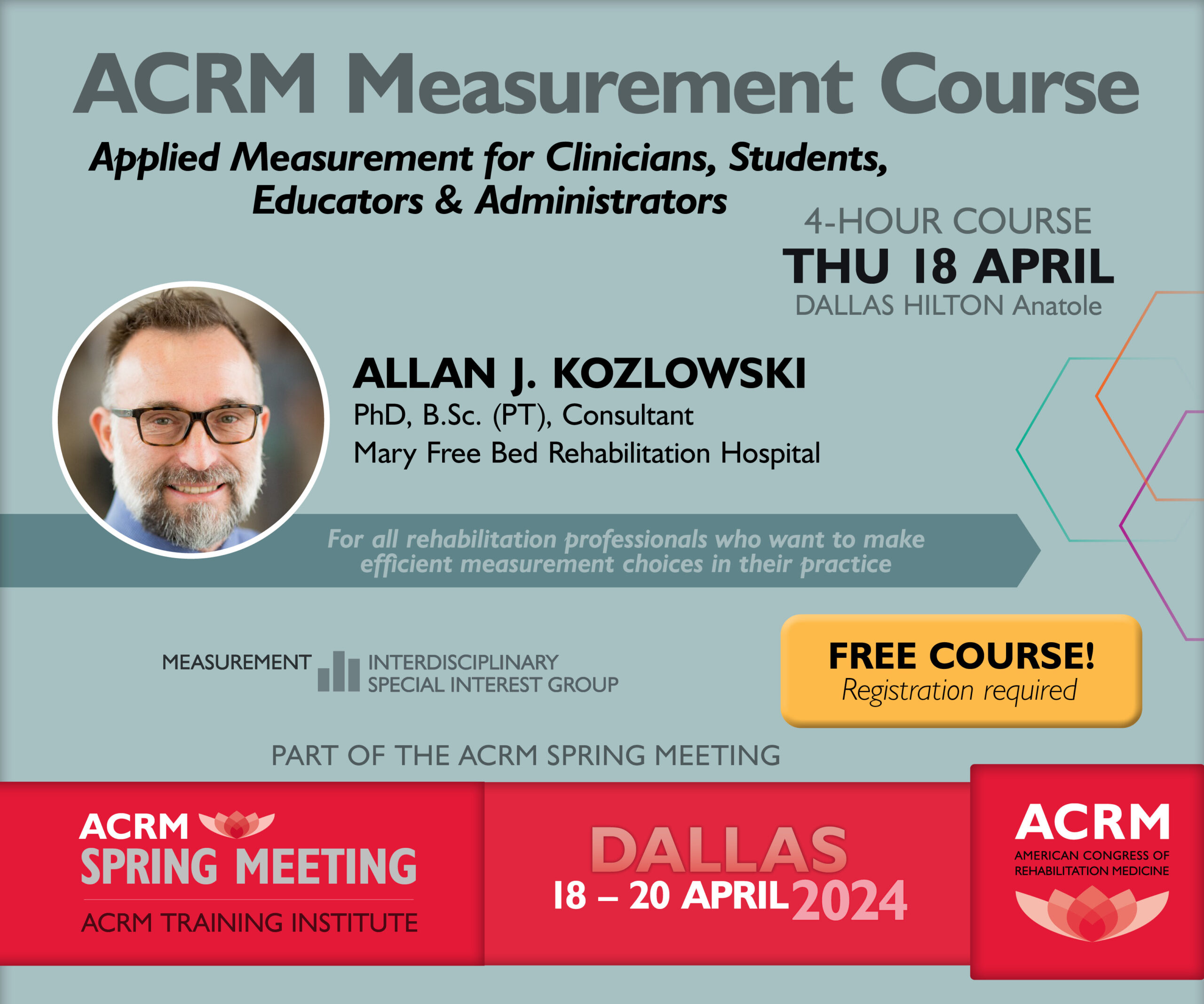MON, 31 OCT // 8:00 AM – 5:30 PM
Primary Content Focus: Crosscutting (The information to be provided and the skills learned are applicable to all diagnostics groups, all rehabilitation settings, and all rehabilitation professional disciplines)
Secondary Content Focus: Clinical practice (assessment, diagnosis, treatment, knowledge translation/EBP), Measurement
This course, sponsored by the ACRM Evidence and Practice Committee, presents “how to” information that will help clinicians and researchers evaluate findings from rehabilitation studies using single case designs and translate them into evidence for clinical practice decisions and recommendations. A primary aim is to equip participants with the knowledge and tools (CONSORT-CENT and the RoBiNT) needed to create and critically evaluate reports of single case design studies. This course will use brief didactic presentations and emphasize applying new knowledge in small work groups.
LEARNING OBJECTIVES
- Describe the key characteristics of single case designs (SCDs) as used in rehabilitation research and clinical applications; explain the potential role of SCDs in contributing to the evidence base of rehabilitation and to one’s clinical practice
- Analyze manuscripts and published articles for the completeness of the information on SCD studies reported, and use the CONSORT-CENT checklist as a guideline in that evaluation
- Analyze published articles reporting SCD research addressing therapeutic questions, assessing their accuracy and scientific rigor; using the RoBiNT instrument
- Make appropriate evidence-based clinical decisions on the selection of treatments based on evaluated research
- Confidently consider SCD as well as group comparison designs in evaluating and synthesizing findings, and producing EBP guidelines and other resources
KEY WORDS
- evidence-based practice
- rehabilitation
- practice guidelines as topic
- research design
- review literature as Topic
FACULTY

Marcel Dijkers
Marcel Dijkers, PhD, FACRM
Research Professor, Icahn School of Medicne at Mount Sinai
Dr. Dijkers is Research Professor, Department of Rehabilitation Medicine of the Icahn School of Medicine at Mount Sinai, New York, NY, and Professor, Department of Physical Medicine and Rehabilitation of Wayne State University, Detroit MI. His rehabilitation research on a number of diagnostic groups (with focus on spinal cord injury and traumatic brain injury) has led to a special interest in research methodologies and the reporting of research, as well as the analysis and synthesis of reported research for practical decision making. He is a member of ACRM’s Evidence and Practice Committee, and has served as the methodologist for a number of guideline development efforts. The recipient of the ACRM Distinguished Member and Gold Key awards, he has published a number of papers on evidence-based practice and the methodologies supporting it.

Robyn Tate
Robyn Tate, BA (Hons), MPsychol, PhD
Professorial Research Fellow, Sydney Medical School – Northern, John Walsh Centre for Rehabilitation Research, Kolling Institute of Medical Research, University of Sydney
Dr. Tate is Professorial Research Fellow at the John Walsh Centre for Rehabilitation Research, Sydney Medical School – Northern at the University of Sydney, Australia. She has a background in clinical and neuropsychology. Research interests include evidence-based clinical practice, methodology of single-case designs, outcomes after traumatic brain injury, and instrument development. Prof Tate initiated and is Program Director of PsycBITE (www.psycbite.com), the Psychological Database of Brain Impairment Treatment Efficacy and she leads a research group developing critical appraisal tools for single-case methodology. She is convenor of an international steering committee to develop reporting guidelines in the CONSORT tradition for single-case research in the behavioral sciences (SCRIBE), and has also been a member of other international steering committees for a range of projects including development of ICF core sets for traumatic brain injury, reporting guidelines for medical N-of-1 trials (CENT), consensus on outcome measures, and knowledge translation in cognitive rehabilitation after traumatic brain injury. She is currently a collaborating author of the second edition of the ACRM Cognitive Rehabilitation Manual and is secretary of the Special Interest Group in Neuropsychological Rehabilitation of the World Federation of NeuroRehabilitation.

Ron Seel
Ronald Seel, PhD, FACRM
Director, Acquired Brain Injury Research, Crawford Research Institute, Shepherd Center
Dr. Seel is Director of Brain Injury Research for the Crawford Research Institute at Shepherd Center. He is a Fellow of ACRM and is the recipient of the ACRM Deborah L. Wilkerson Early Career Award (2010) and the ACRM Distinguished Member Award (2012). Dr. Seel currently chairs the ACRM Evidence and Practice Committee; and formerly chaired the ACRM Awards Committee and the Brain Injury-Interdisciplinary Special Interest Group mild TBI task force. He serves on the editorial board of the Journal of Head Trauma Rehabilitation. Dr. Seel has over 50 peer-reviewed publications in the areas of brain injury, spinal cord injury, research methodology, and outcomes measurement. He was lead editor on the Archives of Physical Medicine and Rehabilitation research education supplement, “Developing and using evidence to improve rehabilitation practice.” Dr. Seel graduated from the College of William and Mary in Williamsburg, VA and completed his MS and PhD in Counseling Psychology at Virginia Commonwealth University (VCU). He was competitively awarded pre- and post-doctoral research fellowships in Rehabilitation and Clinical Neuropsychology at the Medical College of Virginia.

James Graham
James E. Graham, PhD, DC
Associate Professor, University of Texas Medical Branch
Dr. James Graham is an Associate Professor and Director of the Rehabilitation Sciences PhD Program, and a Fellow in the Sealy Center on Aging at the University of Texas Medical Branch, Galveston, TX. His research focuses on the hierarchy of health determinants and how attributes from different levels (i.e., person-level, provider-level, and healthcare system-level) influence the long-term health and functional independence of older adults with chronic health conditions. Current emphases within this framework are healthy aging, health disparities, and health services research. He has authored or co-authored more than 50 peer-reviewed publications in disability- and/or rehabilitation-related research. He has mentored several graduate students, post-doctoral fellows, and junior faculty in research design and methodologies.
One full day of Instructional Courses: $199 // Three full days: $399
WORLD PASS (from $599) is the best value if you attend the CORE Conference and just one instructional course.
CLICK HERE for pricing detail.
CONFERENCE HOME PAGE >>>
ALL PRE-CONFERENCE COURSES >>>
*Although significant changes are not anticipated, all schedules, sessions, and presenters posted on this website are subject to change.










